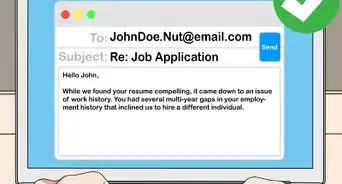This article was co-authored by Katrina Georgiou and by wikiHow staff writer, Hunter Rising. Katrina Georgiou is a career coach and the founder of Katrina Georgiou Coaching based in Silicon Valley. Katrina helps individuals find new careers as well as career advancement, including resume writing, interview preparation, salary negotiation, and performance reviews. Trained in the co-active method from the Coaches Training Institute (CTI), Katrina uses personalized communication and leadership strategies to support her clients in building successful and fulfilling careers.
There are 8 references cited in this article, which can be found at the bottom of the page.
This article has been viewed 113,649 times.
If you’re working full-time and looking for some extra money, it may be time to consider getting a second job. Searching and applying for another job is a similar process to looking for your first job with a few caveats. Whether it be part-time or temporary, be honest with employers and you may find the ideal second job for you.
Steps
Searching for a Job
-
1Do something different than your current job to avoid burning out. Rather than working a similar job to what you already have, try to find something new and different. This helps you become more versatile of a worker and will help you develop new skills along the way.[1]
- If you work in an office during the day, consider working in a retail store or as a restaurant cook part-time.
-
2Watch online job boards for part-time and temporary positions. Websites like Indeed or Monster have new postings each day for positions. These sites will let you sort through work that is part-time or temporary, and they will allow you to type in keywords if you have a position in mind. Check listing sites like these daily to stay updated.
- Craigslist is another great resource for finding jobs and 1-day paid gigs. Search the categories you’re most interested in, but beware of spam posts that seem malicious. If posts make offers or salaries that sound too good to be true, its best to avoid them.
Advertisement -
3Inquire in-person at retail locations and restaurants. If you can, visit during hours when you can speak to a manager. Ask if there are any available part-time or temporary openings. This will help managers know that you have an active interest in working for them.
- This tactic is also useful for small and local businesses that may not post wanted ads.
-
4Consider working part-time in food or retail. These businesses generally have more active evening hours if you already have a full-time day job. Since many of these businesses have a high turnaround rate of employees, many will probably be hiring.
- Bartending and waiting tables is a great option for evening hours with a decent pay after tips.
-
5Look for jobs where you can work from home. There are many jobs that you can work from home, such as tutoring English, reviewing academic papers, or making customer service calls. Specify ‘remote’ or ‘work at home’ when using job search engines to find these positions.
- Working from home requires a structured approach. Set a space inside of your home as an office to avoid distractions.
-
6Sell your freelance writing or creative services. If you are open to writing blog posts or creating graphic design, freelancing may be a good choice for you. Many companies, such as WriterAccess or Listverse purchase articles written by readers.
- Host a portfolio website to show your skills and attract prospective clients.
Networking with Others
-
1Use LinkedIn to maintain professional connections. LinkedIn is a great way to network with other professionals. Maximize the most out of the website by joining groups related to your interests and connecting with others.[2]
- Some companies will post job opportunities on LinkedIn, so follow companies you have an interest in.
-
2Communicate actively with your network. Keep in contact with them by sending out brief hellos and updates on what you’re currently working on. It's best to stay in contact with your professional network at least once every 6 months. Stay professional and positive as you keep in touch.
- Send personalized update emails to your network, especially those in the area you want to work. Thank them for spending time from their day to look over your updates.
- Be specific about your goals. Avoid phrases like, “Let me know if you hear anything.” Instead, say something like, "If you're ever in need of a ______, give me a call."
-
3Join community groups that align with your interests. Finding hobby and enthusiast groups or clubs around your area will help you meet like-minded individuals. These people may help you make a connection to someone hiring in the area you’re looking to work.[3]
-
4Spark impromptu conversations with strangers to expand your network. While you’re waiting in line for a coffee or at a store, introduce yourself and strike up a conversation with someone around you. Don’t be forward about searching for a job, but be friendly and personable while talking about yourself. If you leave a lasting impression, the people you’ve talked to will remember you and may connect with you again.[4]
- Start with a friendly “Hey, how are you doing?” and offer a handshake.[5]
- Ask questions and listen to them to better connect with them.
- Don’t mention your job search initially as not to seem desperate.
- To stay in contact, offer a business card and end the conversation with a friendly good-bye.
Applying for Your Second Job
-
1Be forward by telling the employer you already have a job in your cover letter. Honesty is the best policy when it comes to a potential employer. Letting the employer know your availability is limited will help them understand your current situation and they may be more willing to work with your tight schedule.[6]
- Include a sentence that says, "I am currently employed, but I am eager to work for your company as well."
-
2Include valid experience on your resume. Your resume should be tailored to the specific company that you’re applying for. List skills that are relevant to the position you are applying for and remove any that do not relate. Include past work experience in a chronological order.[7]
- If you're applying for a customer service position in retail, mention how well you interact with people.
-
3Schedule interviews at times where you would be available to work. If you’re already working a 9-5 job, don’t schedule an interview for a second job in the middle of the day. Talk with a potential employer about your available hours and try to plan an interview at those times.
- Some jobs may want you to interview with a manager that only works during the days. Let them know your situation and see if they can be flexible.
-
4Dress according to the company’s dress code. Showing that you are prepared and dressed like an employee will let the employer know that you have researched and care about the job.
-
5Be confident and assertive with your body language. Sit up straight and maintain eye contact with your potential employer. Avoid crossing your arms as this will make you seem closed off.[8]
- Have a firm handshake but don’t squeeze their hands into a death grip.
- Don't slouch or put your feet up since you don't want to seem too comfortable.
- A subtle nod while the employer is talking will show that you have interest in what they are saying.
-
6Negotiate for the best wage. Even though this will be a part-time or temporary job, you should still earn the most you can. Remember, the reason for your second job is the added income. During the interview, bring up prior experiences that are beneficial to the company and discuss the wages and benefits you would receive.[9]
- Be direct with your approach by saying something like, "I need more money than that," but don't sound demanding.
Sample Resume and Cover Letter
Community Q&A
-
QuestionWhat if my main job's hours and commute mean that I only have about an hour and a half free four nights a week, and no other time free? Who is going to hire me for only that much work?
 Mzm555Top AnswererMainly self-employment type jobs will be best for such a short period in regular intervals, such as personal training, gardening/mowing lawns, tutoring, etc. Keep in mind that you may need to commit to some formal training for jobs such as personal training or tutoring.
Mzm555Top AnswererMainly self-employment type jobs will be best for such a short period in regular intervals, such as personal training, gardening/mowing lawns, tutoring, etc. Keep in mind that you may need to commit to some formal training for jobs such as personal training or tutoring. -
QuestionHow can I explain to the other company about an increase my salary?
 CageyCatTop AnswererPerhaps you are asking how to request an increase in salary? That request brings together many factors, which you'll need to weave together. For example, you should consider how long you have been in that field, how long you have worked for that company, how much money others in similar positions earn, the overall job market in your area, any outstanding work you have done in this job, and an idea of how much money you desire in the increase. Cite facts. Be reasonable. Be calm and level headed. Do not make threats. And realize that salaries will be difficult for businesses during a pandemic.
CageyCatTop AnswererPerhaps you are asking how to request an increase in salary? That request brings together many factors, which you'll need to weave together. For example, you should consider how long you have been in that field, how long you have worked for that company, how much money others in similar positions earn, the overall job market in your area, any outstanding work you have done in this job, and an idea of how much money you desire in the increase. Cite facts. Be reasonable. Be calm and level headed. Do not make threats. And realize that salaries will be difficult for businesses during a pandemic.
Warnings
- Don’t put another job before your mental or physical health. Make sure you have time off if you require it.⧼thumbs_response⧽
References
- ↑ https://www.frugalforless.com/best-second-jobs/
- ↑ http://guides.wsj.com/careers/how-to-identify-job-opportunities/how-to-network-your-way-to-a-job/
- ↑ https://www.monster.com/career-advice/article/build-job-search-network
- ↑ https://fortune.com/2012/02/24/6-networking-mistakes-job-hunters-make/
- ↑ https://www.scienceofpeople.com/how-to-talk-to-strangers/
- ↑ https://www.moneycrashers.com/how-to-find-and-manage-a-second-job/
- ↑ Katrina Georgiou. Career Coach. Expert Interview. 25 June 2020.
- ↑ https://www.monster.com/career-advice/article/body-language-can-make-or-break-a-job-interview-hot-jobs
- ↑ https://www.moneycrashers.com/how-to-find-and-manage-a-second-job/

































-Step-20-Version-2.webp)













































